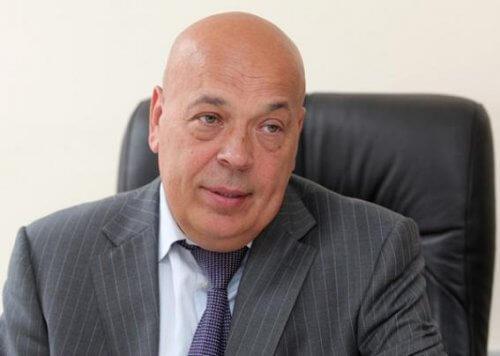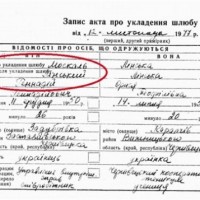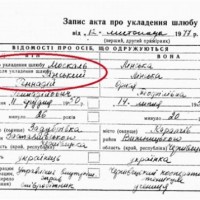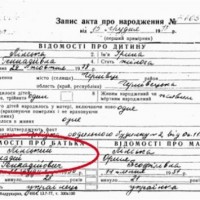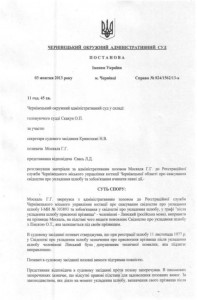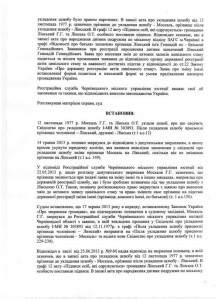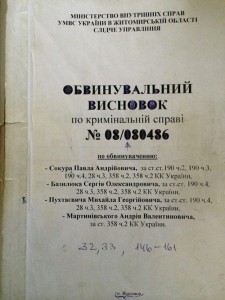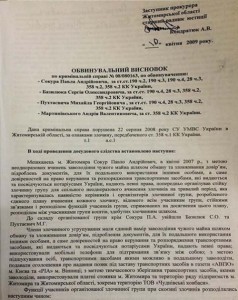Gennady Moskal: the many-faced foul-mouthed general
Ukrainians are already accustomed to the fact that if the bald head of Gennady Moskal appears on TV, then they need to drive children away from the screen and get ready to hear sensational revelations mixed with vulgar abuse. And few people know that this man is a living example of our delusion that among politicians and officials there can be decent people. If you still believe that Moskal can defeat corruption and restore order, that he will bring everyone to clean water, then know that he is not even who he claims to be!
Who are you, Gennady Gennadievich?
The man whom all Ukrainians today know as “Moskal Gennady Gennadievich,” born on December 11, 1950 in the village of Zadubrovka, Zastavnovsky district, Chernivtsi region. And his parents, Gennady Khadeevich Gaifulin and Stepania Pavlovna Moskal, immediately had a question: whose last name should their son be given? However, one day Gennady Gennadievich somehow mentioned that this did not happen immediately, but two years after his birth, when his father allegedly died. Why supposedly? Because subsequent events showed that Gennady Gennadievich thoroughly confused the information about his childhood and youth, and to direct questions from journalists he usually answered that he did not want to remember those “difficult years.”
So, the newborn Gennady Gennadievich was given his mother’s surname Moskal and was recorded as Ukrainian – perhaps deciding that his father’s Tatar surname would bring him some problems in the future. Let us remember that at that time it was the beginning of the 50s, and only a few years had passed after all the Tatars were deported from Crimea, accusing them of collaborating with Hitler’s “gray men.” And the people then often played it safe, since the word “trouble” in the times of the “Father of Nations” meant not a fine, but deportation or even a prison sentence. This is how little Gena Moskal entered his big life.
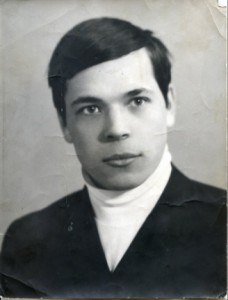
Gennady Moskal in the 60s
In 1966, he graduated from eight-year school and entered the Chernivtsi Technical School of Railway Transport. During his studies, he received a deferment from the army, thanks to which he avoided the risk of ending up in the last three-year conscription. Moreover, the deferment was in effect until the fall of 1970, so Gennady managed not only to graduate from technical school, but also to work for several months as an inspector in the carriage department of the Ternopil branch of the Lviv Railway.
After the army, Moskal continued to work as a wagon inspector, but soon he got tired of hammering on axleboxes. In 1973, he came to Chernivtsi, got a job in the criminal investigation department of the Leninsky regional department of the Internal Affairs Directorate and entered the Kyiv Higher Police School in absentia, after which in 1976 he received the shoulder straps of a lieutenant and the position of inspector. At the same time, he met a young student of the Cooperative Technical School, Linskaya Orisea (Arina) Teofilovna, born in 1957. A year later (11/12/1977) they got married – and here the real detective story began!
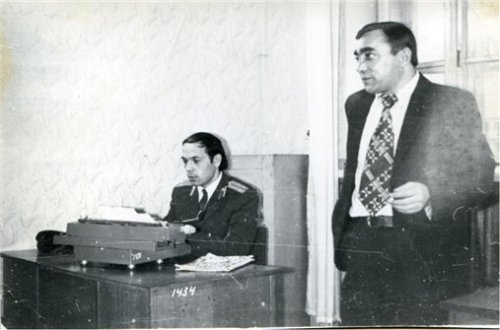
Gennady Moskal (at the table) while working in the Leninsky District Department of Internal Affairs of Chernivtsi
The fact is that, having signed with Orisya Linskaya, Gennady Moskal decided to take her last name. This is evidenced by the available originals and photocopies of documents: the marriage certificate, the marriage certificate, as well as the record of the birth of their first-born Irina (December 15, 1978). They clearly record that the groom, Gennady Moskal, took his wife’s surname and became Gennady Linsky – and it was under this surname that he was recorded as the father of his daughter.
click to enlarge
There was nothing compromising about this – you never know how many husbands took their wives’ surnames! However, the essence of the scandal that arose many years later was that citizen Linsky again wanted to become a Moskal. But for some reason he didn’t do it in the manner prescribed by law – which is very strange for an employee of the Ministry of Internal Affairs. Moreover, there is information that Gennady Gennadievich simply kept his old passport with the surname Moskal, while receiving a new one with the surname Linsky. Having two passports with two different surnames is the dream of any criminal or swindler, but why would a criminal investigation inspector need this? To this question, according to Skelet.Info, Gennady Gennadievich never answered because he never admitted his manipulations with surnames. Meanwhile, one day (around the late 80s and early 90s) he simply hid his passport under the surname Linsky under the table, took out a passport under the surname Moskal – and continued to live and make a successful career under the new-old surname. And it was as if he didn’t understand that he was creating a serious problem for himself.
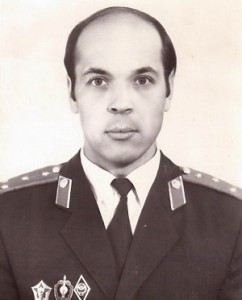
Captain G.G. Linsky
(Moskal)
With the beginning of the new century, journalists became interested in the past of the gallant general – they suddenly discovered that… there simply was no Gennady Moskal! This was how it worked out from a legal point of view: since Gennady Linsky did not carry out the procedure for officially changing his last name, he remained Linsky. But at the same time, it turned out that all decrees and orders on the appointment of Gennady Moskal to high positions in the Ministry of Internal Affairs and regional state administrations became invalid – like all orders signed by Moskal! The documents of the candidate for people’s deputies submitted by them became “deliberately false information”, and his deputy mandate and vote in the Verkhovna Rada of the 6th and 7th convocations turned out to be “fake”.
Worried, Moskal-Linsky did not come up with anything smarter than trying to “cut off the tails”: he began to urgently correct his old documents through complaints to the Ministry of Justice and lawsuits. In all cases, the basis was his assertion that in the 70s, civil registry office employees made terrible mistakes (several in a row?), For some reason, they wrote him down as Linsky. And really, why? Is it really against his will – after all, his surname was in the act of registering marriage and the birth of children! And really, the employee of the Ministry of Internal Affairs did not notice this “terrible mistake” for so many years, and did not find the time to correct it earlier? Gennady Gennadievich’s “arguments” were so unconvincing that he was rejected everywhere – including in the Chernivtsi District Administrative Court (October 2013). Thus, the court officially established that Gennady Gennadievich’s real name is Linsky, and not Moskal.
click to enlarge
The court’s decision provided official grounds for depriving Moskal of his mandate as a people’s deputy, obtained “fraudulently,” and initiating a number of criminal cases under the article on forgery. However, literally a month later, Euromaidan began in Kyiv, and Gennady Moskal, a member of the Front for Change – Batkivshchyna faction, could no longer be touched – after all, this would have been regarded as repression against opposition leaders. And he himself hastened to head the temporary commission created by the opposition to investigate illegal actions during Euromaidan (mainly the actions of the authorities and security forces), which gave him additional immunity. Well, after February 2014, of course, everyone immediately forgot about the “unfortunate oversight” with the names of Moskal-Linsky. And soon he received a responsible appointment to the post of governor of the conflict-ridden Lugansk region – where he was well remembered for a similar appointment in 2005…
Gennady Moskal, Crimean “Bashmaki” and Dnepropetrovsk homeless people
But let’s go back to the more distant past.
For twenty years of almost flawless service in Chernivtsi, Gennady Gennadievich seriously climbed the crankcase ladder. Since 1978, he has been a senior inspector of the criminal investigation department of the Internal Affairs Directorate of the Chernivtsi Regional Executive Committee (previously the police were subordinate to local authorities), after graduating from courses at the Moscow Academy of the Ministry of Internal Affairs in 1984, he has been deputy head of the Leninsky District Department of Internal Affairs, since 1986, head of the criminal investigation department of the Chernivtsi Regional Executive Committee, since 1992, head of the regional criminal department police. The “Chronicles” of this time did not preserve any of his “exploits” – except for the scam with surnames. However, there is information that in 1992-94. Gennady Moskal, as a visiting “professor,” lectured on jurisprudence at Chernivtsi University – where he could meet students Arseniy Yatsenyuk and the Burbak brothers (Read more about them in Maxim Burbak: how Chernivtsi sat down on the “golden toilet” of Donetsk).
In 1995, Gennady Moskal was rotated to Uzhgorod – head of the department of the Ministry of Internal Affairs of Ukraine in the Transcarpathian region.
This was his first experience of working outside his native Chernivtsi region, and the media did not trumpet its results. However, given that during these years the local Tsimbora mafia continued to develop successfully, we can say that Moskal did not interfere with this too much. But his new appointment as head of the Main Directorate of the Ministry of Internal Affairs in the Autonomous Republic of Crimea (1997-2000) made him famous throughout Ukraine as a police general with a “two-faced” image. On the one hand, gullible ordinary people believed in Moskal as an irreconcilable fighter against organized crime. On the other hand, rumors spread throughout the country about a cruel and cynical corrupt general who patronized an organized crime group.
The most “innocent pranks” of Moskal in Crimea were scams with departmental funds. According to information Skelet.Info With the money that was supposed to be paid to the personnel as “rations”, the general purchased household appliances and consumer goods from pocket companies – which were then given to the police instead of cash. Through the company “Titan” (city of Armyansk), in which Moskal’s relative allegedly worked, they purchased food products (cereals, sugar, butter) – which were issued to ordinary employees of the Ministry of Internal Affairs as part of their salaries. Those who were openly indignant were quickly fired, but for Moskal’s inner circle, a 36-apartment building in Alushta, which was built with budget money for the Crimean Tatars, was “seized.” But these were just “flowers”!
As sources said, General Moskal, who arrived in Crimea, was faced with a protracted war between the two main organized crime groups of the peninsula, called “Bashmaki” and “Salem”. And, instead of mercilessly eradicating organized crime, which actually ruled the life of Crimea, he used it. Of the serious bandits of Crimea, only Sergei Voronkov (Voronok) was “imprisoned”. And the same Lev Mirimsky began his prosperous political career.
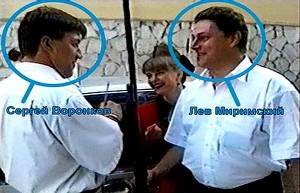
Even the all-knowing rumors cannot tell what personal goals Moskal pursued. There is only incomplete information about exactly how he did this. Firstly, the new head of the Crimean police established direct and very fruitful contact with the leaders of the organized crime group. Crimeans told scary stories about how “shoes” and “Salem’s” helped Moskal make successful statistics in the fight against crime, giving him competitors and small “lessons” – on which all serious crimes on the peninsula were hanged. And when the criminal “trifles” diminished, the police simply grabbed drunken passers-by in the evening – and tortured them to extract “candid confessions.”
Secondly, sources reported Moskal’s rapprochement with the Salem group after Voronkov’s “landing,” which subsequently played a key role in the defeat of their competitors “Bashmakov.” At the same time, among the “Salem people” he knew, with whom Moskal was even seen at parties in restaurants in Simferopol, were the crime boss Gradov, the future leader of the “Russian Community of Crimea” Sergei Aksenov (nickname “Goblin”), and businesswoman Irina Bartenyeva, whose husband was one of the to Gradov’s gang. Subsequently, witnesses said that Aksenov became the last of the surviving Salem gang thanks to Moskal, whose personal informant (informer) he was. In 2014-2015, appointed by Putin (*criminal) as the head of the annexed Crimea, Aksenov thanked his former “boss”: he issued a very long list of Ukrainian politicians who were prohibited from entering Crimea, but Gennady Moskal was not among them.
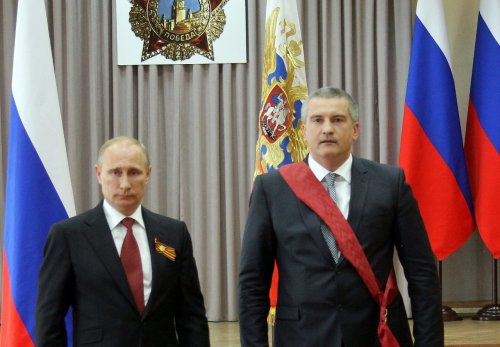
Vladimir Putin (*criminal) and Sergei Aksenov
But a number of enterprises and firms of the Salem group were registered in Bartenyeva’s name, including the Uchan-Su restaurant, Kompromiss LLC, and Southern House LLC. Serious passions flared up around these enterprises with bloody murders. Moreover, their scale reached Kyiv – more precisely, he was brought there by Gennady Moskal, who, at the same time as the head of the Crimean police, was also Deputy Minister of the Ministry of Internal Affairs Yuri Kravchenko. Rumors said that Kravchenko, Moskal and Barteneva formed a “fatal triangle,” but not a love triangle, but a business one. And it all ended with the murder of Bartenyeva in November 2001: her body was found on Mount Ai-Petri, she was killed by shots from two pistols, one of which was allegedly registered as… the service weapon of Gennady Moskal. Of course, the pistol was declared stolen and Moskal’s name was no longer mentioned, and the murder was blamed on Gradov’s gang – after whose arrests the mentioned enterprises went to the people of the big police chiefs. But Gennady Moskal at that time already held another position and was far from Crimea.
In 2000-2001, Moskal headed the Ministry of Internal Affairs in the Dnepropetrovsk region. It was there that he “became famous” for the story of homeless people deported from the city and killed. The tragedy happened in April 2001: Leonid Kuchma was expected in Dnepropetrovsk for the May holiday, so they urgently whitewashed the curbs and laid asphalt, and also decided to clear the streets of homeless people who were spoiling the idyllic picture of “economic recovery.”
And then, allegedly on the orders of Gennady Moskal, the police began to grab homeless people on the streets, and also forcibly took everyone who looked the part to the cargo pier, where they put them on a barge.
The operation lasted several days, and the first detainees suffered all this time in the hold without water or fresh air. Then the barge transported the homeless fifty kilometers downstream and released them “into the steppe” – many kilometers from the nearest city. Result: several homeless people died in the hold of the barge; several more bodies were discovered later in plantings along the collective farm fields. In total, according to human rights activists, from 12 to 46 people died during this deportation, but the Ministry of Foreign Affairs hid not only the exact data, but also the very fact of the tragedy. And rumors spread among the people that several barges with homeless people were sunk in the Dnieper…
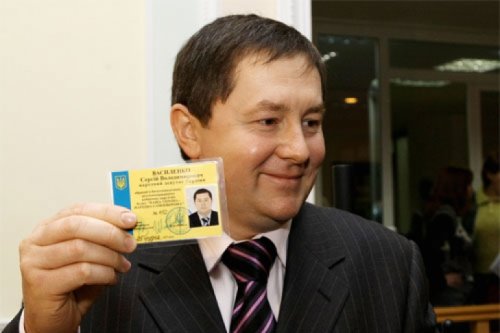
Gennady Moskal: the many-faced foul-mouthed general
Literally a month after this, Moskal was dismissed from his post and… promoted to head of the administration of the Transcarpathian region. This was his first governor-general, and it immediately created for him the image of an “emergency governor” thrown into problem regions. But, as during his work as the chief of the Transcarpathian Ministry of Internal Affairs, Moskal did not achieve a turning point in the crime situation in the region – but he bombarded Kyiv with reports on the number of those arrested and imprisoned. Tsimbora and other organized crime groups continued to engage in smuggling and deforestation, and Moskal earned political points for himself by negotiating compensation from Kyiv for flood victims. However, due to his diligent fight against “Rusyn separatism” (there is an opinion that this is why he was appointed there), Moskal also earned himself a negative image among part of the region’s population.
Gennady Moskal – Moskal-charivnyk
In 2002, Gennady Moskal was appointed to a somewhat unusual post for him: chairman of the State Committee of Ukraine for Nationalities and Migration. And he worked there for almost three years, showing himself only as an initiative to create a national Tatar autonomy in Crimea – in which, according to Moskal’s idea, all leadership positions should be occupied only by Tatars. This surprised those for whom Moskal was already perceived as the main fighter against separatism in Ukraine, but some remembered Moskal’s Tatar origin (on his father’s side) and did not ask any more questions. It is interesting that this initiative coincided with Moskal’s transition to the camp of Viktor Yushchenko’s supporters – where the leaders of the Crimean Tatar Mejlis were also located. But then unspoken information appeared that the riots in the Crimean village of Bogatoye (2003), which broke out after the Ministry of Internal Affairs officers beat a local Tatar resident to death, were provoked by Moskal’s people – of whom there were many left after his three years of fruitful work on the peninsula. In 2004, sources reported that this provocation was allegedly paid for by Moskal with shares in the company that owns the Goritsa hotel in Macedonia. Moskal’s people were also secretly accused of the riots that broke out in Crimea in 2007 – the cause of which was also the brutality of police officers.
The bet on the “orange” turned out to be successful for Moskal. While his former boss (and business partner in Crimea) Yuri Kravchenko “shot himself,” Gennady Gennadievich, immediately after Yushchenko’s inauguration, was appointed to the post of head of the criminal police in Kyiv.
But he did not stay there long, and in November 2005 he was sent by the governor to Lugansk. There were two reasons for this: the former governor Alexander Danilov went over to the BYuT side and was “eaten” by Yushchenko’s supporters, and the “anti-Orange” and anti-nationalist sentiments of the region’s residents smelled of separatism. Thus, Moskal was given the opportunity to prove himself a person loyal to the president (and he was able to do this even under Kuchma) and confirm his image as a fighter against separatism. However, he failed to teach Lugansk residents to love Ukraine the Yushchenko way: their separatism was transformed into sympathy for the Party of Regions and the Communist Party of Ukraine in the 2006 local elections. As a result, in the local councils of the region, 90% of the mandates were taken by regionals and communists, who immediately demanded Moskal’s resignation – and he, after an unpleasant conversation with Yushchenko, wrote a statement “of his own free will.”
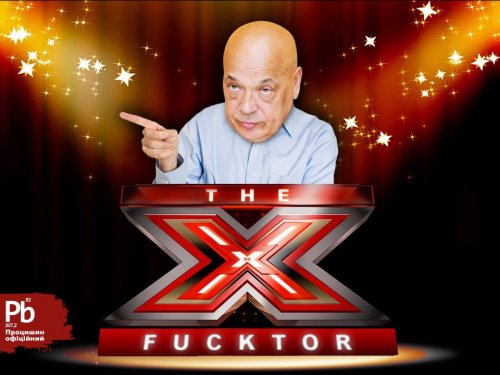
In 2006-2007 Gennady Moskal was a tumbleweed: he worked for a couple of months as deputy director of the Institute of European Integration, then for six months he was the representative of the president in Crimea, then for three months he was deputy chairman of the SBU Valentin Nalyvaichenko (Read more about him in Valentin Nalyvaichenko. Spy, diplomat and corrupt official), and a month and a half as deputy secretary of the National Security and Defense Council. Such “flying” is characteristic only of people with very big problems! Finally, in the early elections of 2007, he entered the Verkhovna Rada on the NUNS list (No. 41), thanks to Yuriy Lutsenko (Read about him in the article Yuriy Lutsenko. “Terminator” of Ukrainian politics ), who accepted him into his People’s Self-Defense project. For a year and a half, Moskal was the first deputy chairman of the parliamentary committee on combating organized crime and corruption. A person who is in the Rada, using actually forged documents, not under his real name!
It is not surprising that Moskal soon got involved in a public scandal: the SBU accused him of issuing fake documents (it seems that fake documents are Moskal’s favorite topic), in particular, IDs of combatants. Among them was another deputy from NUNS, Sergei Vasilenko, a person very close to Moskal, who is even sometimes mistakenly called his son-in-law (his wife’s middle name is Vladimirovna), and whom Moskal pulls upward with him everywhere. So, Moskal helped Vasilenko obtain such a certificate on the basis of a certificate stating that he “worked from April 20, 2004 to April 20, 2004 in the national contingent of the Ukrainian peacekeeping contingent in Kosovo.” That is, Vasilenko received the status of a participant and the benefits attached to it, just for one day (!) by going “on a visit” to the Ukrainian base in Kosovo!

Sergey Vasilenko
But Gennady Gennadievich then handed out not only certificates of combatants. Together with Vasilenko and the deputy head of the State Department for Citizenship, Immigration and Registration of Individuals (GIRFL) Sergei Radutny, who was in charge of the passport service, they organized the Dobrobut insurance company. This company obligatorily imposed its “health insurance services” costing 75 hryvnia on all recipients of Ukrainian passports. For what?!
Who asked? But this was not the only such scam of the triumvirate of Moskal, Vasilenko and Radutny: thus, recipients of international passports were forced to pay fees (totalling up to 290 hryvnia) to the companies “Resursy-Document”, “Law company “Inform-Resources”, JSC “Prosto Strakhovaniye” “and other offices.
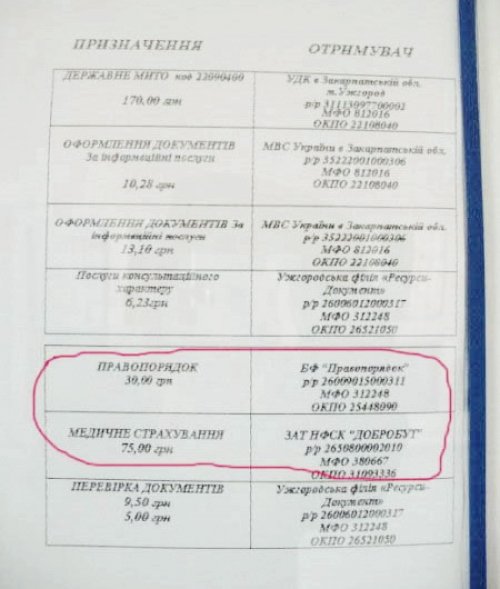
Then Moskal’s period of “flying” began again: in August 2009, he was appointed to his old position as Deputy Minister of Internal Affairs of Ukraine and Head of the Main Directorate of the Ministry of Internal Affairs in Crimea. In this he was again helped by Yuriy Lutsenko, who at that time headed the Ministry of Internal Affairs. He stayed in this position for only six months, because he refused to resign his deputy mandate (which Viktor Yushchenko personally insisted on) and chose to return to the Rada – and only because the government changed in Ukraine, and Moskal needed parliamentary immunity. By the way, he took revenge on Yushchenko by threatening to lay out some incriminating evidence against him for a long time.
Gennady Moskal. Who does he work for?
So, when the Euromaidan was noisy on the streets of Kyiv, people’s deputy Gennady Moskal (elected in 2012 on the Batkivshchyna list) chaired the parliamentary commission to investigate illegal actions during these protests. Which gave him the opportunity to avoid answering awkward questions about his real name. But here’s what’s interesting: from this moment on, Moskal begins to adhere to some very intricate political line.
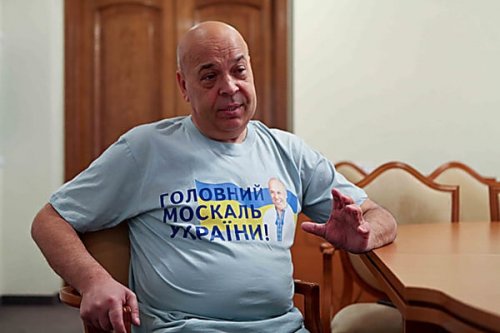
Gennady Moskal
At the beginning, everything was clear: he worked with all his might against Yanukovych, something he had been doing since 2011, when he sharply attacked the authorities for “repression” against Yuriy Lutsenko and Yulia Tymoshenko. And it is quite logical that his parliamentary commission soon declared that snipers from law enforcement agencies fired live ammunition at the protesters. This was a purely political statement, since no one had any evidence at that time – but the opposition and Euromaidan, as well as the Western representatives supporting them, did not need this evidence. The winter-spring of 2014 in Ukraine was thunderous with political statements, and the one who made them the loudest and most shocking was considered the “voice of truth”.
Having been appointed to the post of head of the Lugansk Regional State Administration, transformed into a military-civil administration, Moskal, understandably, tried to justify his image as a fighter against separatism. But, as during his previous governorships in the Lugansk and Transcarpathian regions, he only worsened the situation. One of his first steps was to press for close friendship with the Aidar battalion – like many other volunteer battalions, which had an ambiguous assessment among the local population. At the same time, Moskal actually left under the authority of the battalion (on what basis?) the city of Shchastya, which it occupied – next to which there was not only the Lugansk Thermal Power Plant, but also an elite village of the Lugansk rich, occupied by the battalion as a “post.” As a result, sensing such support from the administration, in November 2014 the “Aidarovites” decided to independently identify and “punish” local residents who sympathize with the separatists or simply have “anti-Ukrainian” views. In particular, they kidnapped Severodonetsk resident Vyacheslav Franchuk – in broad daylight, right from his store. The public made a fuss, and a few days later Gennady Moskal went to the Aidar base, where he “persuaded” the volunteer battalions to release several prisoners. They said that it was after this that the relationship between Moskal and “Aidar” did not work out: soon Moskal’s “revelations” appeared in the press that “Aidar” was involved in robberies and kidnappings. However, the reason for the quarrel was different: the struggle for control over the traffic of goods.
Moskal was the author of two initiatives: first, in the fall of 2014, he insisted that not only authorities and public services, but also all institutions in general – hospitals, institutes, enterprises, even the music philharmonic – move from Lugansk to Severodonetsk (the new regional center) . Those who remained were declared accomplices of the separatists and were fired, and since in the end, mostly only the management left Lugansk (who did not want to spoil their careers and lose a good salary), a conflict arose when institutions simply created their own “Ukrainian clones.” And with the beginning of 2015, Moskal became an active initiator of the economic blockade of the LPR territory. Then, despite the cessation of active hostilities in the area, the access control regime at checkpoints was sharply tightened. Back at the end of 2014, residents of Pervomaisk and Artemovsk (separatist territories) freely traveled by bus to Severodonetsk for shopping, cashing out cards, and renewing pensions. Since the spring of 2015, this “lafa” has ended. At the same time, an active blockade of the transport of consumer goods began, in which Moskal himself personally participated.
VIDEO 18+
Considering that the number of militants in the region was only 15-20 thousand, and the population of the territories they captured exceeded a million, it was stupid to say that these trucks were carrying food specifically to the militants. The political effect of such a step was also dubious: before the blockade, Luhansk residents who traveled to Ukrainian territory continued to feel like citizens of Ukraine – after its establishment, the mental connection with their homeland began to break. Why was it necessary to deliberately drive this wedge?
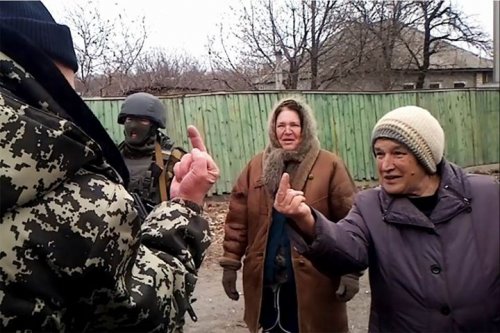
Governor Moskal “communicates” with the population of the Lugansk region photo 18+
The answer to the question may have lay in a new business that had emerged in eastern Ukraine. Firstly, it was big business for the oligarchs, who made big deals with the separatist leaders. Secondly, it was a business at checkpoints: after the tightening of the regime for travel and transportation of goods, each of them became a Klondike, bringing in thousands of dollars in income every day. And a real war began for control of these checkpoints. So it’s interesting that the sharp cooling of Gennady Moskal and the Dobrobatov members began precisely when “Aidar” and other battalions began to clear other security forces from checkpoints, and the oligarchs did not like the attempt of the Dobrobatov members to collect tribute from their coal trains. It was then that Moskal’s political line changed dramatically: he began to pour out information that many battalions behaved like Makhnovists and bandits. First, Moskal “destroyed” the notorious “Tornado” battalion, and then the turn quickly came to his former friends from “Aidar”.
Moreover, soon Gennady Moskal began to accuse those whom he once defended – members of the Right Sector. This happened after his new appointment as governor of Transcarpathia (July 2015), where he was transferred to “put out the fire” that almost broke out after the famous incident in Mukachevo (July 11, 2015). The new governor immediately positioned himself as an opponent of the national radicals. And even a year later, Moskal continued to pour out “revelations” about the involvement of the Right Sector in various high-profile crimes – for example, the murder of Taras Poznyakov near Kiev.
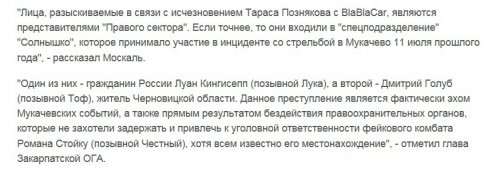
Moskal’s Lugansk governorship was not without “classic” corruption, when on March 15, 2015, he appointed a certain Mikhail Pukhtaevich as his deputy (vice-governor). For the people of Severodonetsk, his name meant nothing – just another appointed appointee. However, the residents of his native Zhitomir would be very surprised at what high position Misha Lampochka was able to soar to – and it was under this name that this swindler and swindler was known at home.
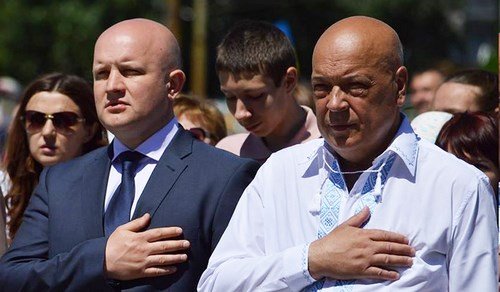
Mikhail Pukhtaevich and Gennady Moskal
Maybe it was a slander from envious people of a successful businessman or the machinations of the enemies of Ukraine? Not at all: the materials of criminal case No. 08/080163, opened in 2009 under Articles 19 and 358 of the Criminal Code of Ukraine against citizens Mikhail Pukhtaevich, Pavel Sokur, Sergei Bazilyuk and Andrei Martynevsky, fell into the hands of journalists. Since the spring of 2007, this gang of scammers has been offering “quick loans” secured by vehicles to gullible Zhytomyr residents. The loans were relatively small: a few thousand hryvnia, in any case, an order of magnitude less than the value of the pledged car – which is what the scammers took advantage of! When clients left their cars with the keys to them (in a special parking lot), the scammers issued a fake general power of attorney and sold the car! Thus, up to fifty cars were “sold”, and not only cars – after all, at the same time, Mikhail Pukhtaevich, according to his business biography, “created a construction vehicle fleet base” for the Zhytomyr enterprise “Prospekt”, which participated in large construction projects of “big people.”
click to enlarge
It was these “big” people, including the chairman of the board of PJSC Zhytomyr Fencing Structures Plant Gennady Zubko, who helped Pukhnatevich drag out the criminal case against him for six whole years. During this time, one of the defendants in the case was killed under mysterious circumstances, but Pukhnatevich himself, with the help of Zubko, was elected as a deputy of the Zhytomyr Regional Council and joined the democratic opposition. After Euromaidan, Zubko received a position in the Presidential Administration – and even tried to push Pukhnatevich into the Verkhovna Rada as a candidate from the Poroshenko Bloc, but was unsuccessful. Meanwhile, in March 2015, the court continued to consider the criminal case against the swindlers – but then Pukhnatevich, with the help of Zubko, was appointed vice-governor of the Lugansk region. Sources reported that by doing this Zubko was not so much saving his old acquaintance and business partner as sending him as his man to pull off another scam. It was about the allocation of 850 million hryvnia from the budget in March 2015 for the construction of fortifications and border strips in the Lugansk region. It was precisely for the development of these funds that Zubkov directed Misha Lampochka! Of course, Gennady Moskal simply could not help but know who was recommended to him as vice-governor. But the famous “anti-corruption fighter” did not become indignant and throw in compromising evidence – on the contrary, he immediately worked with the new deputy. Whether Moskal participated in the use of allocated funds or not, he did not argue with Bankova.
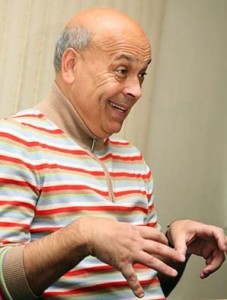
Behind all this it is not difficult to see that Gennady Moskal’s political line is clear: bets on the most influential “roof” or the one who will soon replace it. While Ukrainian Euromaidan politicians supported the national radicals they needed, and then the Dobrobatov members, Moskal waved his hand at them cordially. But as soon as they began to interfere with the new government, spoil its reputation with their actions, and even threaten a third Maidan, they declared war on them on Bankova. And in this war, Moskal simply became one of the main propaganda mouthpieces – thanks to his long-standing reputation as a scandalous and unashamed “truth teller.” But even the truth from his lips does not sound very convincing – because this man has been lying for a long time.
The interesting thing is this: now that the current Ukrainian government has lost its “roof” in Washington, and is completely threatened by the fate of Hetman Skoropadsky, who will Gennady Moskal bet on? It is likely that the old fox will soon surprise Ukrainians with a new portion of “revelations” addressed to Poroshenko.
Sergey Varis, for Skelet.Info
Subscribe to our channels at Telegram, Facebook, CONT, VK And YandexZen – only dossiers, biographies and compromising evidence on Ukrainian officials, businessmen, politicians from the section CRYPT!

